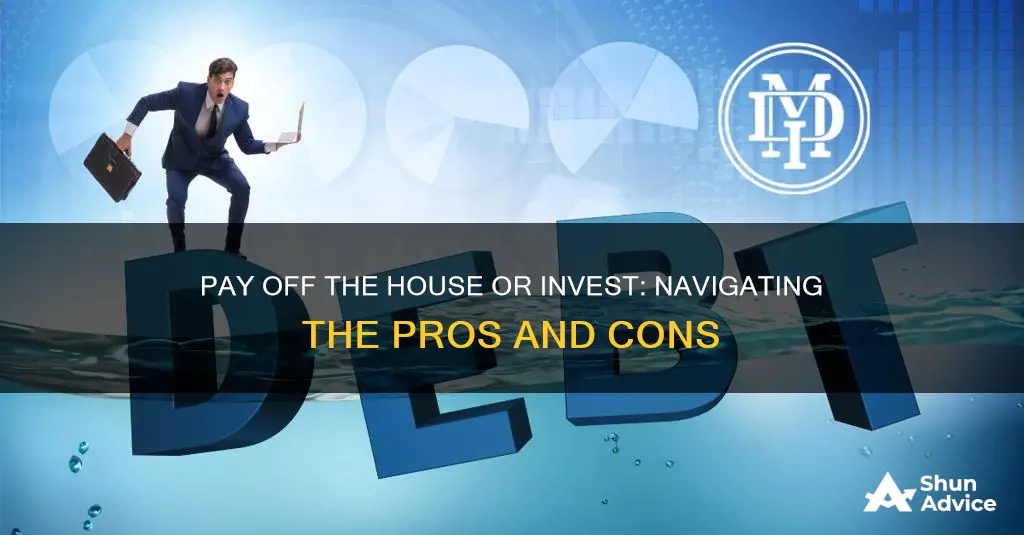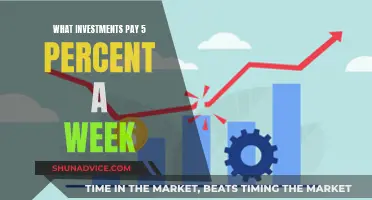
Paying off your mortgage or investing your money elsewhere is a common dilemma for homeowners. The answer depends on your individual circumstances, but there are some key considerations to help you decide.
One factor is your risk tolerance. Paying off your mortgage is generally considered a safer option as it's predictable and you know exactly how much you're saving. On the other hand, investing in the stock market, for example, carries more risk but could offer higher returns.
Another thing to think about is where you are with your mortgage payments. If you're in the early years of your mortgage, it's usually smarter to pay off as much as possible to avoid paying more in interest over time. However, if you're nearing the end of your mortgage term, you may want to focus on investing to build your future wealth.
Additionally, you should consider the opportunity cost of paying off your mortgage early. By investing your money instead, you could potentially earn higher returns than the interest you'd save by paying off your mortgage early. However, investing also carries the risk of losses, so it's important to weigh up the pros and cons carefully.
Ultimately, the decision to pay off your mortgage or invest depends on your financial situation, risk tolerance, and how much debt you're comfortable with. Consulting a financial advisor can help you make an informed decision that aligns with your goals and tolerance for risk.
| Characteristics | Values |
|---|---|
| Interest savings | Paying off your mortgage early can save you thousands in interest payments. |
| Peace of mind | Paying off your mortgage early can ease your debt burden and reduce the risk of losing your home. |
| Build equity | Paying down your mortgage faster means building equity in your home more quickly, which can help you qualify for refinancing. |
| Opportunity cost | Paying off your mortgage early means missing out on other financial goals, such as retirement savings or other higher-return opportunities. |
| Wealth is tied up | Property is an illiquid asset, meaning you can't quickly or easily convert it to cash. |
| Loss of tax breaks | Paying off your mortgage early may result in the loss of tax deductions for mortgage interest. |
| Higher returns | Investing offers the potential for higher returns compared to paying off your mortgage early. |
| Liquid investment | Investing provides liquidity, allowing you to easily sell and access your money if needed. |
| Employer match | Investing in a retirement account may come with the benefit of employer matching contributions. |
| Higher risk | Investing in the stock market carries more risk and volatility compared to paying off your mortgage. |
What You'll Learn

Paying off your mortgage early can save you thousands in interest
Paying off your mortgage early can save you a significant amount of money in interest. However, it's important to weigh the benefits against the potential downsides, such as losing out on investment opportunities or reducing your liquidity. Here are some key points to consider:
Interest Savings
This is one of the most significant advantages of paying off your mortgage early. By reducing the principal amount early on, you can save thousands or even tens of thousands of dollars in interest payments over the life of the loan. This represents a guaranteed return on your investment.
Peace of Mind and Financial Security
Being debt-free and owning your home outright can provide a sense of financial security and peace of mind. Eliminating a monthly mortgage payment, especially near retirement, can be liberating and reduce stress.
Building Equity
Paying off your mortgage faster allows you to build equity in your home more quickly. This can be advantageous if you're looking to refinance or take out a home equity loan or line of credit (HELOC) to access cash for renovations or other financial goals.
Opportunity Cost
When you put extra money towards your mortgage, you're forgoing other investment opportunities. For example, you might miss out on the potential for higher returns in the stock market or other investments. Additionally, consider the liquidity of your assets. Property is an illiquid asset, meaning it can take time and effort to convert it back into cash if you need funds quickly.
Tax Implications
Paying off your mortgage early may result in losing certain tax benefits. Mortgage interest payments are often tax-deductible, and by eliminating this expense, you may end up with a higher tax bill. Consult a tax advisor to understand the specific implications for your situation.
Personal Circumstances
Ultimately, the decision to pay off your mortgage early depends on your personal financial situation and goals. If you have other high-interest debts, such as credit card debt, it may be more beneficial to prioritize paying those off first. Consult a financial advisor to help you weigh your options and make a decision that aligns with your short-term and long-term financial objectives.
Sand Dune P250: Worth the Investment?
You may want to see also

Investing instead could double your money
If you're wondering whether to pay off your mortgage or invest, it's important to consider the potential benefits of investing. While paying off your mortgage early can save you thousands of dollars in interest, investing your money could offer even higher returns.
Let's look at an example. Suppose you have a 30-year mortgage of $200,000 with a fixed interest rate of 3.5%. If you pay off your mortgage early, you can save on the interest you would have paid. However, investing that money instead could result in higher returns.
For instance, if you invest $100,000 with an average rate of return of 5% for 10 years, you would earn $62,889. This is more than double the interest saved by paying off the loan early, even with a higher loan rate of 5.5%compound interest, where you earn interest on the interest you've already accumulated. This can lead to even higher returns over time.
Another advantage of investing is liquidity. Stocks, bonds, and similar investments can be sold relatively easily if you need cash, whereas selling a home or refinancing can be a more complex and time-consuming process.
Furthermore, if you invest in a retirement account, you may benefit from employer matching contributions, further increasing your returns.
However, it's important to remember that investing carries a higher risk than paying off a mortgage. The stock market can provide significant returns, but it also comes with the risk of losses. It's crucial to consider your risk tolerance and financial goals when making this decision.
Invest in Yourself: Your Greatest Asset
You may want to see also

The stock market has historically returned an average of 10%
When deciding whether to pay off your mortgage or invest, it's important to consider your financial situation, risk tolerance, and investment goals. One key factor to consider is the potential return on investment.
- Volatility and Timing: While the average return is 10%, individual years can vary widely. Some years may see returns far above or below this average, and there is no guarantee of positive returns in any given year. Timing your entry and exit from the market is crucial, as buying during market lows and selling during highs will result in larger returns. However, attempting to time the market is challenging and not recommended for beginner investors.
- Long-Term Investment Strategy: Investing in the stock market is most effective for long-term investments. Money invested for at least five years has the potential to generate higher returns than shorter-term investments, which are better suited for lower-risk options like high-yield savings accounts.
- Compounding and Rule of 72: The power of compounding enhances the impact of the 10% average return over time. According to the Rule of 72, dividing 72 by the rate of return estimates how long it will take for your investment to double. At a 10% annual return, your money should double every 7.2 years.
- Historical Performance: The S&P 500, a benchmark for overall market returns, has experienced significant ups and downs since its inception. Since 1928, it has returned 9.90% annually, including the Great Recession and the dot-com crash. Over shorter periods, such as the last 10 and 20 years, the average annualized returns have been higher, at 13.05% and 10.20%, respectively.
- Impact of Inflation: Inflation significantly affects the real return on investment. The historical average annual return of the S&P 500 is around 6.37% when adjusted for inflation. This adjustment assumes the accuracy of the Consumer Price Index (CPI) in measuring inflation, which some analysts believe understates the true rate.
- Comparison to Other Investments: The stock market's average return of 10% compares favourably to other investments. For example, investing $100 in U.S. Treasury bonds, corporate bonds, or real estate over the long term would result in significantly lower returns than investing in a well-diversified stock portfolio.
In conclusion, the stock market's historical average return of 10% is a powerful argument for investing rather than paying off your mortgage early. However, it's important to remember that past performance does not guarantee future results, and there will always be a level of uncertainty and risk associated with stock market investments.
Investment Calls: Why You?
You may want to see also

Paying off your mortgage gives you peace of mind
Paying off your mortgage early can give you peace of mind in a few ways. Firstly, it can be a safer move financially, as it is a predictable expense and you will know exactly how much you are saving. This can be especially beneficial if you are averse to debt and view it as a threat. Additionally, paying off your mortgage early can save you thousands of dollars in interest payments over the life of the loan. This can free up funds that can be invested elsewhere or used for other financial goals. Finally, paying off your mortgage can provide a sense of independence and autonomy, as you will no longer have a large monthly expense and will be debt-free.
Vanguard Investors: How Many?
You may want to see also

Investing in stocks is riskier
When it comes to deciding whether to pay off your mortgage or invest, there are several factors to consider. While investing in stocks can provide higher returns, it is also riskier compared to paying off your mortgage early. Here are some reasons why investing in stocks is riskier:
Volatility and Risk
Stocks are subject to market volatility and carry a higher level of risk compared to paying off debt. The stock market experiences ups and downs, and there is always the possibility of losing money when investing in stocks. While historical data shows that stocks have provided higher average returns over the long term, there are no guarantees. The performance of stocks depends on various factors, including company performance, economic conditions, and market sentiment.
Uncertainty and Fluctuations
The stock market is influenced by numerous factors that are difficult to predict accurately. These include changes in company leadership, competitive positioning, industry conditions, economic trends, and geopolitical events. These factors can cause stock prices to fluctuate, and investors may experience losses if they are not careful.
Business and Downside Risk
Investing in stocks carries business risk, which refers to the uncertainty and potential financial loss associated with a specific company's stock. Downside risk estimates the potential decline in value for stocks due to market-related factors. Changes in supply and demand, economic conditions, investor sentiments, and broader market trends can all impact stock prices negatively.
Inflationary Risk
Inflation can erode the real value of investment returns and the purchasing power of investors. Inflationary risk refers to the possibility that inflation will outpace the returns on investments, leading to a decrease in the actual value of assets over time. This is especially relevant for fixed-income investments like bonds and cash holdings, which may not provide adequate protection against the erosion of value caused by inflation.
Peace of Mind
Paying off your mortgage early can provide peace of mind and reduce stress. By eliminating the burden of constant debt, you no longer have to worry about making monthly mortgage payments. This can be especially beneficial if you experience a financial emergency, as you won't have to worry about missing payments and the potential loss of your home.
In summary, investing in stocks offers the potential for higher returns but also carries a higher level of risk compared to paying off your mortgage early. It is important to carefully consider your financial situation, risk tolerance, and investment goals before making any decisions. Consulting with a financial advisor can be helpful in making an informed choice.
Songs: The New Investment Avenue
You may want to see also
Frequently asked questions
The pros of paying off your mortgage include:
- Saving on interest.
- Being debt-free.
- Leveraging your equity.
- Freeing up funds for other investments.
The cons of paying off your mortgage include:
- Cutting into savings.
- Missing out on other investments, such as your retirement fund.
- Losing tax deductions.
- Paying prepayment penalties.
The pros of investing your money include:
- A higher rate of return.
- Increasing your future wealth.
- Better asset liquidity.
- Potential for an employer match.
The cons of investing your money include:
- Higher risk.
- Still having to make debt payments.







